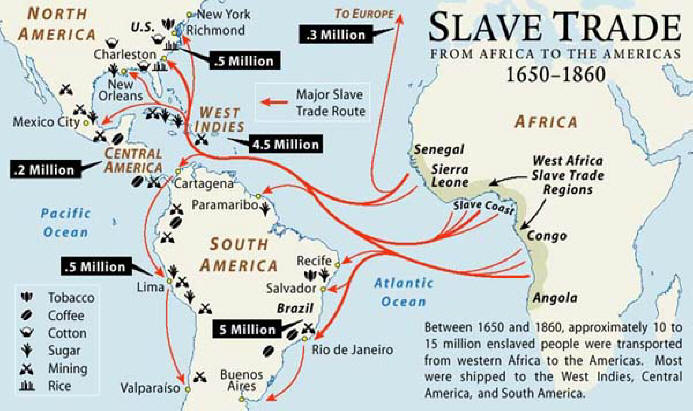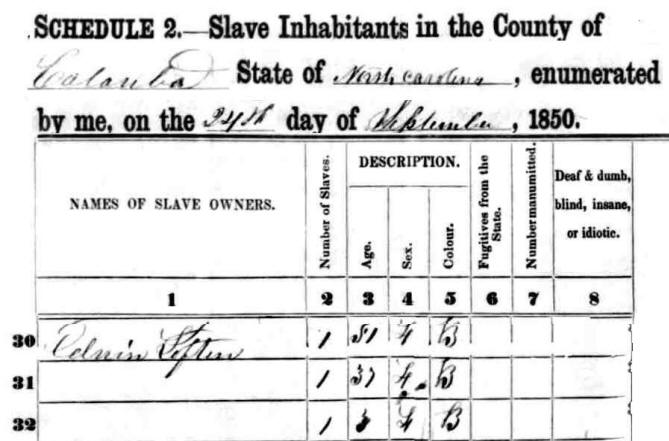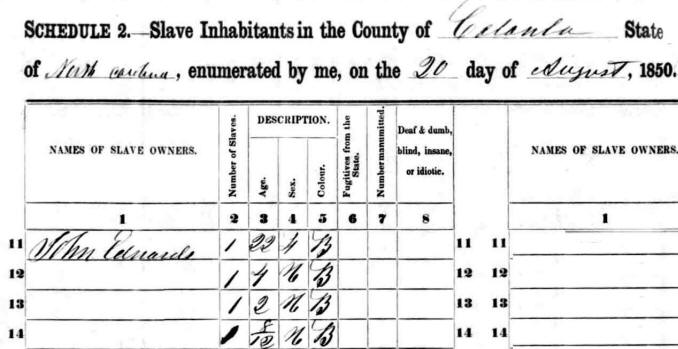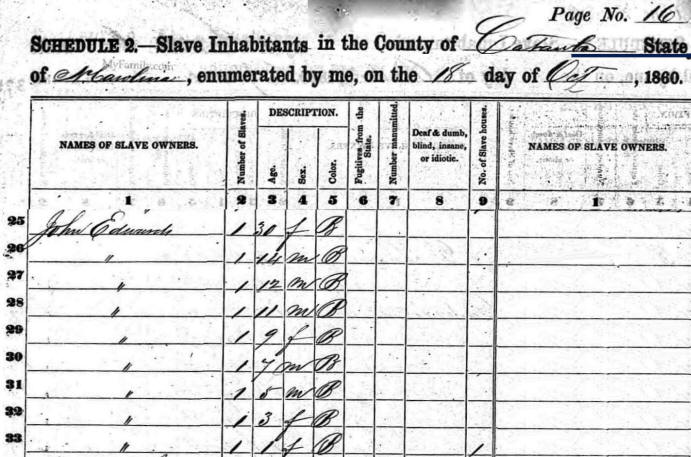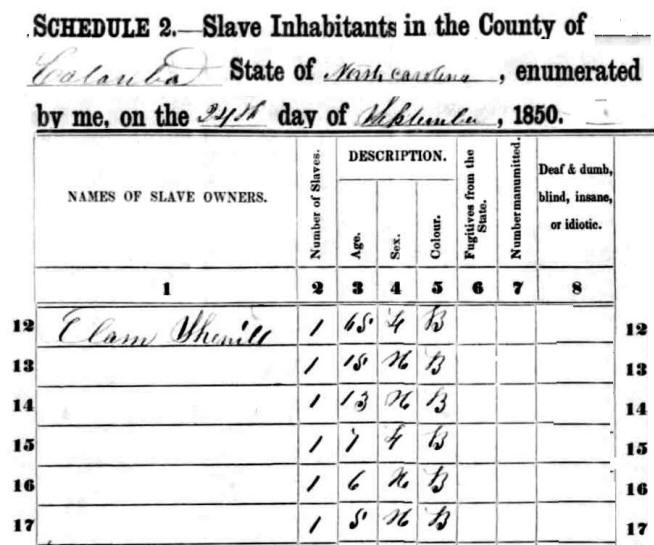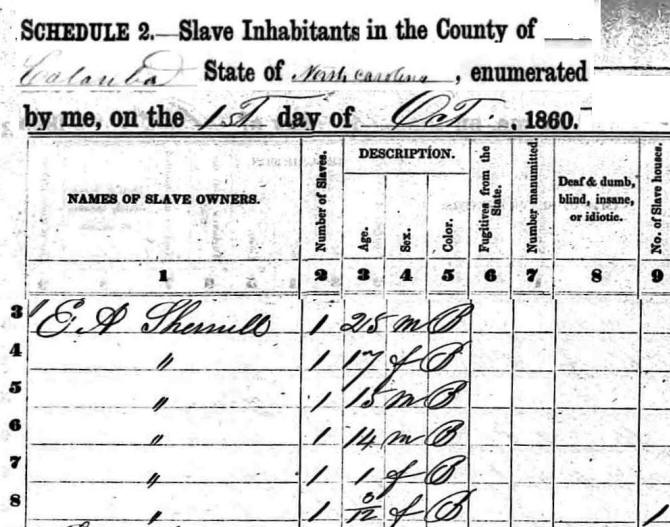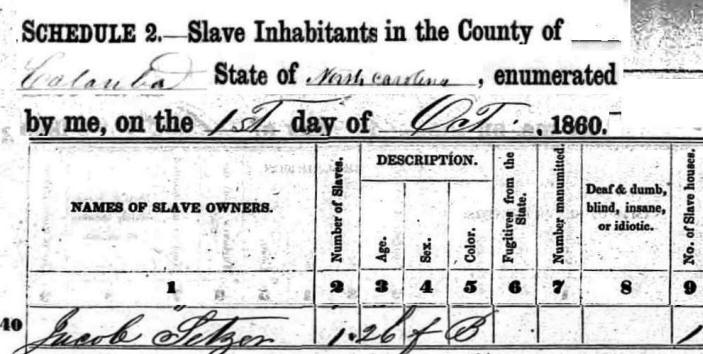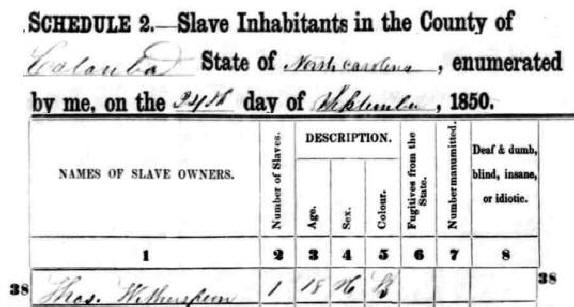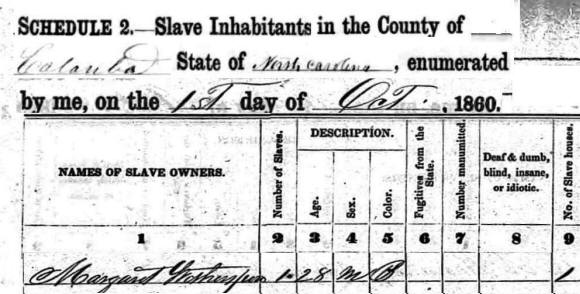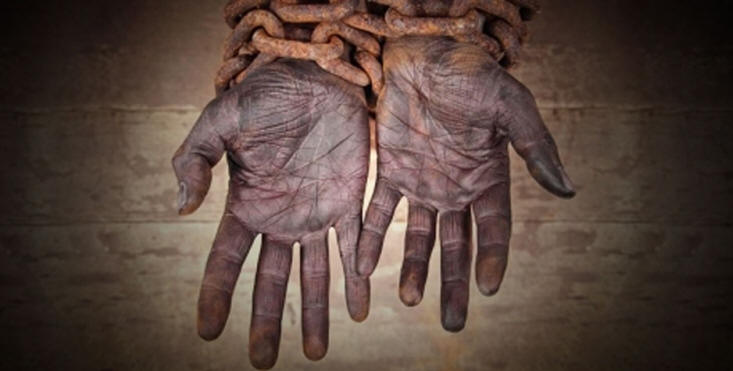Slavery
FAMILY
NAMES
WITH
SLAVES
BARRINGER
BEATTY
HAMILTON
LOFTIN
McCORKLE
SETZER
SHERRILL
WITHERSPOON
_________
LOFTIN:
Beatty
Corzine
Cranford
Fisher
Givens
Harwell
Kaiser
Lanier
Loftin
Lomax
McCorkle
Rudisill
Sherrill
Upright
Washington
Work
SETZER:
Aderholdt
Barringer
Bovey
Bushart
Deal
Heavner
Herman
Ikert
Miller
Motz
Rankin
Setzer
Witherspoon
GOBLE:
Babst/Bobst
Douglas
Faber
Fink
Fulbright
Goble
Hefner
Meinhert
Miller
Muller
Pabst/Bobst
Robinson
JOHNSON:
Corzine
Fink
Hamilton
Johnson
Kaiser
Leslie
Lewis
Moore
Sherrill
Upright
Wilkinson
_______
Family
SURNAMES
A Closer
Look
_______
LINKS
History of
NC Counties
CARS
Catawba
Station
Township
Catawba
Elementary
& High School
Cemeteries
The
CIVIL
WAR
Additional
Family
SURNAMES
Genealogy
HUMOR
PHOTO
LINKS
Recent
UPDATES
The
"ROYAL"
Lineage
Slavery
Twins
WHERE
TO
FIND 'EM
PAGE
________
FAMILY
NAMES:
Barringer
Beatty
Betz
Bovey
Bushart
Corzine
Cranford
Deal
Douglas
Fink
Fisher
Fulbright
Givens
Goble
Heavner
Hefner
Herman
Johnson
Kaiser
Leslie
Loftin
Lomax
McCorkle
Miller
Pabst/Bobst
Setzer
Sherrill
Weeks
Work
Slave Records & Information
A True History of Company I, 49th Regiment NC Troops
in the Great Civil Warby W. A. Day Newton, NC 1893 Slavery, that great curse of all races, was 1st introduced by New Englanders, who had vessels fitted up for the purpose of kidnapping Africans and bringing them to this country and selling them into slavery.
Some of the Southern States were much opposed to the slave traffic that they passed laws, and so anxious were the people of the U.S. to put an end to this iniquitous traffic, that in 1807 Congress passed a law forever prohibiting the importation of slaves to the U.S.
The New Englanders had introduced it, made his money by selling them South, found it was not profitable North, then when the trade was prohibited by law, all at once his conscience began to lash him in regard to the poor Negro in the South; and he began to cry for liberation.
Lincoln was elected. South Carolina too hasty, rash and inconsiderate, passed the ordinance of secession; other states soon followed. Virginia, on the North, went out, what was North Carolina to do? She still refused to secede; it was voted on and voted down in N.C., but when Lincoln called on N.C. for 75,000 troops, then the old north state began to move, if she must furnish troops at all, she would furnish them for her out southland.
It seems hard for our Northern brethren to understand us. They had an idea that every man down here was a slave owner and was an aristocrat; what a mistake.
I will venture that (in) any company from Catawba, there were but a few slave owners among them, but you went my brethren to fight for your rights, for liberty, which was guaranteed to you under the then existing Constitution; a right that your Northern brethren had advocated and preached for years.
According to the 1860 Catawba County Slave Schedule, there were 292 slave owners in the county, 1613 slaves (777 male & 839 female) and 340 slave houses. Some of our ancestors did indeed own slaves prior to the Civil War. The BARRINGERS
Mathias Barringer [1727 - 1776], Great-Great Grandfather of Ida Lillian Setzer Loftin, had two slaves, a husband & wife, when he came into the territory in 1762.
The BEATTYS
Charles (Manson) Beatty [1795 - 1863], father of Tyler Beatty, brother of Sally Lavina Beatty (wife of Thomas Loftin), is listed on the 1850 Catawba County Slave Schedule as having 2 slaves, a 38-year-old female and a 26-year-old male.
Calvin Beatty (son of Charles Manson Beatty) is listed on the 1860 Catawba County Slave Schedule (page 19) as having 1 slave.
Franklin Beatty (son of Charles Manson Beatty) is listed on the 1850 Catawba County Slave Schedule as having 6 slaves: a 60-year-old male, a 59-year-old male, a 44-year-old female, a 12-year-old female, a 10-year-old female and a 9-year-old female. According to the 1860 Slave Schedule (page 19) he had 3 slaves.
Thomas Beatty is listed on the 1850 Catawba County Slave Schedule as having 9 slaves. According to the 1860 Slave Schedule (page 19) he had 11 slaves
The HAMILTONS
# 1 Hamilton Family - Letter concerning slaves (Goble/Johnson ancestry) Letter Dated: February 4, 1837
From: Drury Hamilton
Living In: Willow Grove, NC
To: Archibald Hamilton II (Uncle)
Living In: State of Indiana, Washington County, Salem Post Office
Dear friends and relatives -
I have taken my seat one time more in order to write a few lines to you to inform you that we are all in good health at present - hoping these few lines will find you all enjoying the same blessing. I will inform you that your friends is all well at present as far as comes within my knowledge.
I will now give some account of our seasons - last summer was very wet, last fall was wet and cold and the winter this far has been almost the coldest that I ever saw. Wheat crops was only middling - corn crops in upland was good but the bottom lands was light. Produce of every kind is high - cotton is selling from 15 to 18 dollars per hundred - wheat has sold as high as one dollar and fifty cents per bushel - flour at market from 12 to 14 dollars per barrel - corn 50 cents per bushel - pork from 6 to 8 dollars per hundred and as for negros there is no bounds. I have known some negro fellows to sell as high as fifteen hundred dollars cash up and no grumbling. The people are running hundreds of them off to the states of Alabama and Mississippi and if they were all gone, I should be glad.
Dear Uncle, I have given you some account of the friends at large, I will now say something more of them individually. Your sister Rachel Sherrill was in good health about a week ago and doing well. Mason Sherrill and family is well, also Alfred Sherrill and family is in good health and doing very well.
I can also inform you that Henry Lollar has sold all his negros or rather his wife's negros and the plantation that he formerly lived on, and has bought Washington Thomas's land at Thomas Ferry - for which he gave three thousand dollars.
I will now say something of your friends on the other side - John Bridges and family is in good health at this time - the old man appears to take the world fair and easy. Two of his boys, Elisha and Nicholas are married to two of the widow Jones daughters - George Jones daughters. Elisha and Alfred Bridges and families are all well - they appear to be getting along in the world very well. They have bought 190 acres of land of Mr. Fry - it lies joining them - they gave five hundred dollars. James Bridges was to have been in this country last September, but he did not come and has not been heard from since. His friends are very uneasy about him for fear something has happened to him or his family.
Dear friends I have wrote something about the most of the friends - I suppose you would not think it amiss if I should write something about myself. I would in the first place say that I have nothing to boast of but I am getting along tolerable well. I have cleared about 40 acres of land since I was married the last time. I have four very thriving children. We had a boy November 1835, but it only lived three days.
I have three nags and cattle and hogs a plenty to do me very well. I raised a very good crop of oats last year - a tolerable good crop of wheat and a very good crop of corn, and I expect to sell 4 or 5 hundred pounds of bacon this spring. Also, I bought a surveyer's compass two years ago for 26 dollars and I have made about 70 dollars by surveying land some. I will now tell you, as I am getting scarce of paper that I received a letter from you about two years ago and was very glad to hear from you. I will say to you that this is the third letter I have wrote to you since, but have received no answer as yet. If you have not wrote I hope you will as soon as you read this letter, so I will add no more at present, but rememberyour affectionate friend -
Drury Hamilton
# 2 Hamilton Family - Letter concerning slaves (Goble/Johnson ancestry) Letter Dated: June 16, 1837
From: Drury Hamilton
Living In: Lincolnton, NC
To: Ninian Hamilton (b. 1789 - Uncle)
Living In: State of Indiana, Washington County, Salem Post Office
My much Esteemed friend:
By divine providence I have been once more permitted to write a few lines to you informing you that we are all on the land amongst the living, and enjoying a reasonable portion of health at present - hoping these lines will find you all in the same state of health.
Your friends is all well on both sides as far as I know. Our winter has been very hard - our spring late and cold, and at this time dry. Our wheat is generally thin on the ground, but appears to be well headed. Oats is short - corn small for this season of the year. I will inform you that there is a very great change taken place in the aspect of things since I wrote to Uncle Archibald last winter.
Cotton took a very sudden fall in the market this spring and that has reduced the price of almost everything - even money is becoming a cash item - horses is down one third, and negros that was selling for double their value can scarcely be given away, but bread and meat is not down yet. Corn is selling from seventy-five cents to one dollar per bushel - bacon twelve and fifteen cents per pound.
Flour at home four and five dollars per hundred. I sold some at market this spring at twelve dollars per barrel - cakes comes high. We have very little fruit this year - it was mostly killed with the late frost.
I will now give you some account of our political affairs in this country - they have been very much changed since you left here. Our state constitution has been altered and amended - we send members to the Legislature according to the number of population. Lincoln County sends four in the commons and one in the senate. The people has the electing of the Governor, the sherriffs, the clerks of the courts, and the constables. Our Legislature is to meet once in two years - we are becoming a republican people. Our old friend, Henry W. Conner, is still going to Congress - he has no opposition this year.
Well I will now write a few lines to Aunt Margaret informing her that her friends are all well so far as I know. Your stepmother is well as common. William Bandy and family is in good health. Your sister, Elizabeth Bandy, had a fine son last fall, the only one that she has had since you left here - also two of their daughters is married. Myra was married about a year ago to Mr. Joseph Sherrill, son of Camy Sherrill, aged 17 years. Elvira was married last fall to Franklin Kirksy. You in no doubt wish to know what sort of men they are - on this part I will say but little, but I think if they were put in the balance with smart men they would be found wanting.
You will in the next place inquire if any of your friends have died. There is but one that I know of. That is Daniel Wilfong, son of Peter Wilfong. He died last summer with the fever. I have nothing more to write to you at present, but wish to remain your friend. My wife sends her best love and good wishes to you.
Well, my old uncle, a few more lines to you. I will inform you that I received a letter from you on the third day of June - it was dated March 10th - it must have had a long journey, but made a safe arrival. I was truly glad to hear from you all one time more and that you was all well and doing well. You wrote that you would take a newspaper from Lincolnton, called the newspaper, Lincoln Transcript. I will inform you that there is another paper called the newspaper, Lincoln Republican, printed there - it has lately been established. You can have your choice, but as you are not here to choose for yourself, I will choose for you. I will send you the Republican as I like it best. I expect to start to Lincolnton tomorrow morning to forward it to you.
I expect you would be glad to hear about all your old neighbors and acquaintances. I would willingly write something about them all if the limit of my letter would permit, but it will not. There has a great many things happened in the neighborhood since you left here that I could tell you if I was with you, but I cannot with them all. I will record one which you can depend on being correctly true, that is concerning Ephraim Kale. He has been in a practice of going to see Sally Butler for the last three or four years, and their conduct has caused a final separation between her and her sister, Elizabeth. They have divided their land and other property. Elizabeth is living in the house where the family lived, and Sally is living in a little house that Lewis Powers built on their land. How Kale and his wife gets along I am not able to say as to my own knowledge, but the neighbors say that he has to use the rod once and a while to keep things as cool as possible at home. What I have wrote is a certain truth.
I will now say to you that your old neighbor, John Shin, died about a year ago. The family is all dead but Prudy. She is living in Rowan. I could tell you many things more but paper and time is both growing scarce, so I must shortly close. Give my best respects to Uncle Archibald and family.
I have been looking for a letter from him but have seen none yet. Write to me as soon as possible and let me know how you all are and if you get your newspaper. I add no more but remain you loving friend till Death. Excuse much haste and bad writing.Yours, Drury Hamilton
# 3 Hamilton Family - Letter concerning slaves (Goble/Johnson ancestry)
Letter Dated: March 3, 1849
From: Drury Hamilton (age 47)
Living In: Lowrance Mills, NC
To: Ninian Hamilton (b. 1789 - Uncle) (age 60)
Living In: Salem P. O., Indiana
Dear Uncle and Aunt:
I take my pen in hand to write a few lines to let you know that I am still on the land among the living, and in good health for which I feel very grateful to Him who gives all good things, and hope these lines find you enjoying the same blessings. I received your letter this morning and read it with great satisfaction to hear from you all another time and also to hear the good tidings of peace and plenty and good health among you. You say that I must make some good excuse for not writing sooner - I hardly think you have much room for complaint unless you had been more punctual to write yourself, but be that as it may, I will say no more about it at this time, but will render you my excuse as it is. I wrote you two letters some six months ago - the first one I got no answer to date - the last one I wrote, if I mistake not, in the spring of 1847. I received a letter from you in December (1847) following, which had been wrote in June but not mailed until the 17th of November, in which you informed me that you had been to Tennessee* and found it a very good country, from which I drew the inference that you intended to move there immediately - that is the reason that I did not write. I knew if I directed it to Salem, Indiana, and you should be gone that you would not get it and if you were gone to Tennessee I did not know where to direct a letter.
Upon them terms I concluded to wait until I heard from you again as I knew you was one letter in my debt, but as to anything wrong between us, I will assure you my old Uncle there is nothing on my part, far from it. I would be so thankful to see the members of your family. I can think of nothing better and hope to have the pleasure of seeing you one more time. I hope you will receive my excuse and pardon my omission for not writing sooner.
I will now give you some account of the times in our country - we have peace and plenty - crops last year was generally good. I raised a good crop of oats - a tolerable good crop of wheat and a very good crop of corn - so that we have nothing to complain of in the way of eatables. Corn is selling from 25 to 33 1/3 cents per bushel - wheat 75 cents per bushel - pork 3 and 4 cents per pound - and other things in proportion, but we buy our salt, sugar, and coffee equally as low as we sell our produce.
I will give some account of our season - last fall was dry and warm and very pleasant until November - this month was very cold, but December was warm for the season until Christmas - since then we have had some very cold weather. There was considerable snow in January, and February has been very cold, dry and windy. We had two warm days this week but is cold and cloudy at this time, the wind blowing from the east and looks very much like rain.
You wish me to write all the particulars concerning father (Reuben Hamilton, age 73) - this would be rather delicate task, but I will give you some of them. The old man is getting along in the world as well as could be expected - he had a negro boy with him four or five years that brother Reuben bought in South Carolina, but he took him away about twelve months ago - he has Lawson Bynum, my son-in-law living with him and my youngest sister Nancy is with him.
He makes plenty of everything to live on and generally some to spare, but the old man's mind is failing him - he never wrote Uncle Thomas (Thomas Cleophas Hamilton) a line since he was in this country (January 1840 ? letter). Old Aunt Rachel (Hamilton) Sherrill is living with her grandson, Franklin Sherrill. She is well and getting along very well - all the rest of the friends is well as far as I know.
My old and affectionate friend I have wrote as much to you as I can spare paper for , so as I wish to write a line to the children, therefore I must come to a close but before I conclude I must request you to write to me as soon as convenient, as I am always very glad to get a line from you, so I add no more, but remain your affectionate friend until death.Drury Hamilton
The LOFTINS
John Loftin [1740 - 1793] had at least 14 slaves, listing them in his Last Will & Testament dated 03 Aug 1793. He left them to his wife and children upon his death. Their names were: Dilvy, Pegg, Fanny, Andrew, Kate, Lucy, Jenny, Doctor, Scott, Ephram, Charlotte, Silva, Rose and Bob.
James Loftin [1768 - 1836] inherited two slaves from his father John Loftin (1740 - 1793) at the time of his death. They were Fanny (f) and Dilvy. The 1810 Census for Lincoln County shows that James had 11 slaves. James had 7 slaves at the time of his death in 1836, listing them in his Last Will & Testament dated 05 Apr 1833. He left them to his wife, Susannah, and children upon his death. Their names were: Fan (f), Gin (f), Cass (f), Hammilton (m), Epps (f), Washington (m) and Andrew (m). Upon his death, & that of his wife, the slaves were passed to their children John, Edmund, Mary, Elizabeth & Nancy. For some reason, James' two sons Thomas (our direct ancestor) and Henderson did not inherit slaves.
There is an Edwin Loftin listed on the 1850 Catawba County Slave Schedule (page 11) with 3 female slaves: a 3-year-old, a 37-year-old and a 51-year-old. This was more than likely Edmund Loftin, son of James & Susannah Sherrill Loftin.
John Edwards, husband of Mary E. Loftin & son-in-law of James Loftin, was listed on the 1850 Catawba County Slave Schedule (page 8) as having 4 slaves: a 22-year-old female, a 4-year-old male, a 2-year-old male and an 8-month-old male.
The 1860 Catawba County Slave Schedule (page 17) shows John & Mary Loftin Edwards as having 9 slaves. It's 10 years later and they still have the 4 slaves from 1850, and have added 5 more, and also added a slave house.
Elam Sherrill, husband of Nancy Loftin & son-in-law of James Loftin, was listed on the 1850 Catawba County Slave Schedule (page 11) as having 6 slaves: a 65-year-old Female, an 18-year-old male, a 13-year-old male, a 7-year-old female, a 6-year-old male and a 5-year-old male.
By 1860, Elam & Nancy Loftin Sherrill still had 6 slaves, but only two of them seem to be the same ones from 1850. The 1860 Catawba County Slave Schedule (page 15) shows them as having a 25-year-old male, a 17-year-old female (she would have been 7 on the 1850 Census), a 15-year-old male (who would have been 5 on the 1850 Census), a 14-year-old male, a 1-year-old female, and an 8-month-old female. He had also added a slave house.
The McCORKLES
Matthew L (Locke) McCorke (1817-1899), son of Francis Marion McCorkle Jr & Elizabeth Mariah Abernathy, is listed on the 1850 Catawba County Slave Schedule as having 2 slaves, a 10-year-old female and a 15-year-old male. He is listed on the 1860 Slave Schedule (page 1) as having 9 slaves and 1 slave house.
Alexander McCorkle [1775 - 1854], son of Francis Marion McCorkle Sr & brother to Isabella McCorkle and Great Uncle to James Franklin Loftin, is listed on the 1850 Catawba County Slave Schedule as owning 36 slaves from the ages of 2-months-old to 72-years-old. He died in 1854.
Francis McCorkle (Jr.) [1786 - 1853], son of Francis Marion McCorkle Sr & 1/2 brother to Isabella McCorkle is listed on the 1850 Catawba County Slave Schedule as owning 15 slaves from the ages of 2-years-old to 31-years-old.
Agnes McCorkle (1788-18??), daughter of Francis Marion McCorkle Sr & 1/2 sister to Isabella McCorkle, is listed on the 1850 Slave Schedule as having 2 slaves.
The SETZERS According to the 1850 Catawba County Slave Schedule, the following Setzers had slaves.
1850 Catawba County Slave Schedule Name of Slave Owner Census Year Page Slave Age Slave Sex Daniel Setzer 1850 1 7 Male 2 31 Male George Setzer 1850 1 29 Female 1 12 Male 1 18 Female 1 10 Female 1 3 Female Reuben Setzer 1850 2 11 Male
1860 Catawba County Slave Schedule Name of Slave Owner Census Year Page Slave Age Slave Sex Frank Setzer 1860 14 17 Female 6 Male 5/12 Male George Setzer 1860 1 50 Female 40 Female 28 Male 25 Female 23 Male 18 Female 15 Male George Setzer 1860 15 38 Male Mary Setzer 1860 15 60 Female Jacob Setzer is listed on the 1860 Catawba County Slave Schedule (page 14) as having one 26-year-old female slave and 1 slave house. Margaret Witherspoon was the next entry on the top of the same page.
The SHERRILLS
There were many Sherrills who owned slaves according to the 1850 Catawba County Slave Schedule.
Elam A. Sherrill had 6 slaves in 1850 and 6 slaves in 1860. Elam was married to Nancy Loftin, the daughter of James Loftin & Susannah Sherrill.
Eli Sherrill had 5 slaves in 1850. He was the 3rd Cousin of Levina C. Sherrill Johnson and 1/2 Grand-nephew of Susannah Sherrill Loftin (wife of James Loftin).
Gabriel Sherrill had 7 slaves in 1850 and 10 slaves in 1860. He was the Grand-Son-in-law of Francis Marion McCorkle.
Hiram Sherrill had 8 slaves. He was the nephew of Susannah Sherrill (wife of James Loftin). Hiram was also the 2nd Cousin once removed to Levina C. Sherrill Johnson.
Jeptha Sherrill had 13 slaves in 1850 and 3 slaves in 1860. He was the son-in-law of Francis Marion McCorkle Sr and the husband of the 1/2 Great-Aunt of James Franklin Loftin.
Mason Sherrill had 4 slaves. He was the uncle to Levina C. Sherrill Johnson. Mason was the 1st Cousin once removed of Susannah Sherrill Loftin (wife of James Loftin).
Additional Sherrills with slaves on the 1850 and 1860 Catawba County Slave Schedules included:
1850 Catawba County Slave Schedule Slave Owner No. of Slaves Slave Owner No. of Slaves Daniel Sherrill 1 Lawsen Sherrill 5 Daniel Sherrill 1 Mahala Sherrill 16 Elam A. Sherrill 6 Mary Sherrill 5 Eli Sherrill 5 Mason Sherrill 4 Elisha Sherrill 1 Matthew Sherrill 7 Gabriel Sherrill 7 Miles Sherrill 2 Henderson Sherrill 10 N. Sherrill 11 Hiram Sherrill 8 Reuben Sherrill 2 Jane Sherrill 2 Reuben Sherrill 3 Jeptha Sherrill 13 Ruben Sherrill 1 Joshua Sherrill 1 Silas Sherrill 6
1860 Catawba County Slave Schedule Slave Owner No. of Slaves Page Slave Owner No. of Slaves Page E. A Sherrill 6 15 J. A Sherrill 1 20 E. B. Sherrill 2 17 J. F. Sherrill 7 16 Elisha Sherrill 18 19 J. I. Sherrill 3 16 Elizabeth Sherrill 3 17 Jeptha Sherrill 3 17 Elizabeth Sherrill 5 18 Lavina Sherrill 1 18 Elizabeth Sherrill 5 19 Mahala Sherrill 15 14 Elizabeth Sherrill 4 20 Martha E. Sherrill 2 18 Gabriel Sherrill 10 20 Sarah Sherrill 8 18 G. M. Sherrill 4 20 Woodford Sherrill 6 18 Henderson Sherrill 12 13 The WITHERSPOONS
Thos./Thomas (Wesley) Witherspoon is listed on the 1850 Catawba County Slave Schedule (page 1) as owning one 18-year-old male slave. Thomas was the father of Miles Rankin Witherspoon, Great-Grandfather of Ida Lillian Setzer Loftin.
When Thomas died 16 Jan 1856, his slave passed to his wife Margaret Rankin Witherspoon. Margaret is listed on the 1860 Catawba County Slave Schedule (page 14) as having one 28-year-old male slave and 1 slave house. He is more than likely the same slave from 1850, just 10 years older.
Before 1850, slave pens, slave jails, and auction blocks were a common site in the District of Columbia, a center for domestic slave trade. On 16 Apr 1862, the nations capitol ended slavery. President Lincoln signed an act abolishing slavery in the District of Columbia, an important step in the long road toward full emancipation for African Americans.
Slavery was abolished by the United States Constitution, Amendment 13 - Ratified 12/6/1865 after the conclusion of the Civil War.
William Alexander "Alec" Loftin and a group of other men, left Shiloh Methodist Church because of "friction" following the Civil War, and started Center Methodist Church. Alec's grandfather, Thomas Loftin, did not inherit slaves from his father, James Loftin. All of James Loftin's children inherited slaves except for Thomas and his brother, Henderson Loftin. Alec's father-in-law, Rev. Manley Wilson Cranford, attended Mt. Pleasant Methodist Church in Sherrills Ford. The church had been established by a local group of citizens with anti-slavery feelings.
Oldest Former Slave Nears Century Mark 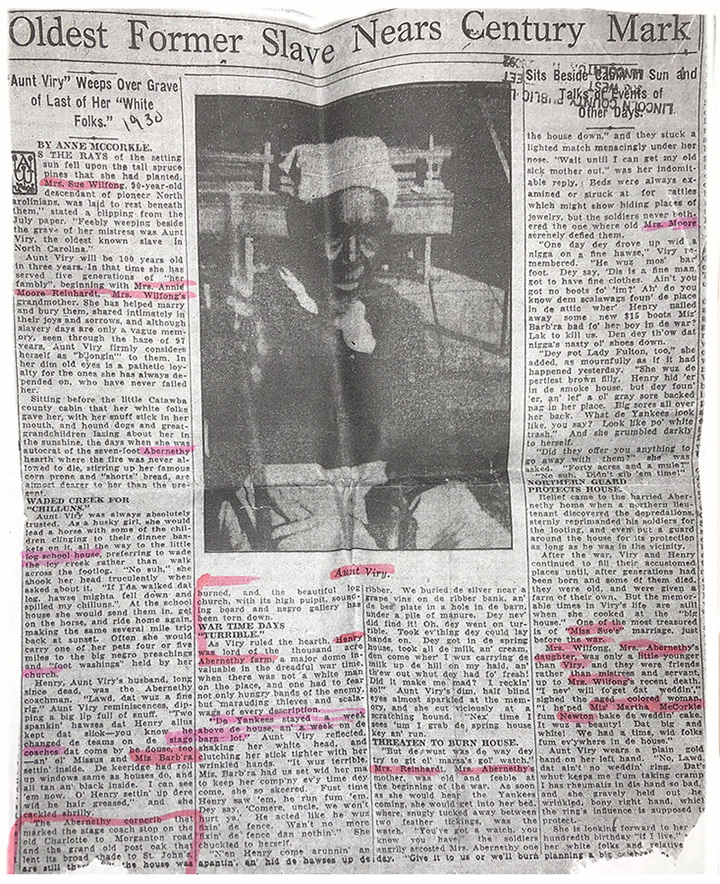
“Aunt Viry” Weeps Over Grave
of Last of Her “White Folks”
1930, North Carolina
By Anne McCorkle“As the rays of the setting sun fell upon the tall spruce pines that she had planted, Mrs. Sue Wilfong, 90-year-old descendant of pioneer North Carolinians, was laid to rest beneath them,” stated a clipping from the July paper. “Feebly weeping beside the grave of her mistress was Aunt Viry, the oldest know [living] slave in North Carolina.”
Aunt Viry will be 100 years old in three years. In that time she had served five generations of “her family”, beginning with Mrs. Annie Moore Reinhardt, Mrs. Wilfong’s grandmother. She has helped marry and bury them, shared intimately in their joys and sorrows, and although slavery days are only a vague memory, seen through the haze of 97 years, Aunt Viry firmly considers herself as “belongin’” to them. In her dim old eyes is a pathetic loyalty for the ones she has always depended on, who have never failed her.
Sitting before the little Catawba County cabin that her white folks gave her, with her snuff stick in her mouth, and hound dogs and great-grandchildren lazing about her in the sunshine, the days when she was autocrat of the seven-foot Abernethy hearth where the fire was never allowed to die, stirrig up her famous corn pone and “shorts” bread, are almost dearer to her than the present.
WADED CREEK FOR CHILLUNS
Aunt Viry was always absolutely trusted. As a husky girl, she would lead a horse wit some of the children clinging to their dinner baskets on it, all the way to the little log school house, preferring to wade the icy creek rather than walk across the footlog. “No suh (sir),” she shook her head truculently when asked about it. “If I’da (I had) walked dat (that) log, hawse (horse) mighta fell down and spilled my chilluns (children).” At the school house, she would send them in, get on the horse, and ride home again, making the same several mile trip back at sunset. Often she would carry on of her pets four or five miles to the big negro preachings and “foot washings” held by her church.Henry, Aunt Viry’s husband, long since dead, was the Abernethy coachman. “Lawd (Lord), dat wuz (that was) a fine rig (carriage),” Aunty Viry reminiscences, dipping a big lip full of snuff. “Two spankin’ hawses dat Henry allus (always) kept dat (that) slick – you know, he changed de (the) teams on de stage coaches dat come by de house, too – an’ ol’ (old) Missus and Miz Barb’ra settin’ inside. De keeridge (The carriage) had roll up windows same as houses do, and all tan an’ black inside. I can see ‘em now. O’ Henry settin’ up dere wid he (sitting up there with his) hair greased,” and she cackled shrilly.
The Abernethy corncrib that marked the stage coach stop on the old Charlotte to Morganton road and the grand old post oak that lent its broad shade to St. John’s are still there, but the house was burned, and the beautiful log church, with its high pulpit, sounding board and negro gallery [location where the slave sat during church services] has been torn down.
WAR TIME DAYS “TURRIBLE”
As Viry ruled the hearth, Henry was lord of the thousand acre Abernethy farm, a major domo invaluable in the dreadful war time, when there was not a white man on the place, and one had to fear not only hungry bands of the enemy, but marauding thieves and scalawags of every description.“De (The) Yankees stayed a week above de house, an’ a week on de barn lot,” Aunt Viry reflected, shaking her white head, and clutching her stick tighter with her wrinkled hands. “It was terrible, Miz. Barb’ra had us set wid her ma to keep her comp’ny ev’y time dey come, she so skeered. (Miss Barbara had us sit with her ma to keep her company every time they come, she was so scared.) Fust time Henry saw ‘em, he run fum ‘em. Dey say, ‘Come’re, uncle, we won’t hurt ya.’ (Henry saw them, he ran from them. They said ‘Come here, uncle, we won’t hurt you.) He acted like he wuz fixin’ de fence. Wan’t no more fixin’ de’ fence dan nothin’.” (He acted like he was fixing the fence. He weren’t/wasn’t no mor fixing the fence than nothing.) She chuckled to herself.
“N’en, Henry come arunnin’ and apantin’, an’d hid de hawses up de ribber. (Then, Henry came running and panting and hid the horses up the river.) We buried de silver near a grape vine on de ribber (river) bank, an’ de bes plate in ahole (and the best plate in a hole) in de barn, under a pile of manure. Dey nev’ (They never) did find it! Oh, dey went on terrible. Took ev’thing dey could lay hands on. Dey got in de spring house, took all de milk an’ cream, den come wher’ I wuz carrying de milk up de hill on my haid, an’ th’ew out what dey had fo’ fresh! (then come where I was carrying the milk up the hill on my head, and threw out what they had for fresh!) Did it make me mad? I reckin’ so!” Aunt Viry’s dim, half-blind eyes almost sparkled at the memory, and she cut viciously at a scratching hound. “Nex’ time I sees ‘um I grab de spring house key an’run.
THREATEN TO BURN HOUSE
“But de wust was de way dey try to git ol’ marsa’s gol’ watch.” (But the worst was the way they tried to get old master’s gold watch.) Mrs. Reinhardt, Mrs. Abernethy’s mother, was old and feeble at the beginning of the war. As soon as she would hear the Yankees coming, she would get into her bed, where snugly tucked away between two feather tickings [covers/quilts], was the watch. “You’ve got a watch, you know you have,” the soldiers angrily accosted Mrs. Abernethy one day. “Give it to us or we’ll burn the house down.” And they stuck a lighted match menacingly under her nose. “Wait until I can get my old sick mother out,” was her indomitable reply. Beds were always examined or struck at for rattles which might show hiding places of jewelry, but the soldiers never bothered the one where old Mrs. Moore serenely defied them.“One day dey drove up wid a nigga on a fine hawse,” Viry remembered. “He wuz mos’ bar foot. Dey say, ‘Dis is a fine man, got to have fine clothes. Ain’t you got no boots fo’ ‘im?’ Ah’ do you know dem scalawags fou’ de place in de attic wher’ Hanry nailed away some new $15 boots Miz’ Barb’ra had fo’ her boy in de war? Lak to kill us. Den dey th’ow dat nigga’s nasty ol’ shoes down.”
(“One day they drove up with a Negro on a fine horse,” Viry remembered. “He was most bare footed. They say, ‘This is a fine man, got to have fine clothes. Ain’t you got no boots for him?’ Ah’ do you know them scalawags found the place in the attic where Henry nailed away some new $15 boots Miz’ Barbara had for her boy in the war? Nearly killed us. Then they threw that negro’s nasty old shoes down.”)
“Dey got Lady Fulton, too,” she added as mournfully as if it had happened yesterday. “She wuz de pertiest brown filly. Henry hid ‘er in de smoke house, but dey foun’ ‘er, an’ lef’ a ol’ gray sore backed nag in her place. Big sores all over her back. What de Yankees look like, you say? Look like po’ white trash.” And she grumbled darkly to herself.
(They got Lady Fulton, too,” she added as mournfully as if it had happened yesterday. “She was the prettiest brown filly. Henry hid her in the smoke house, but they found her, and left an old gray sore backed nag in her place. Big sores all over her back. What did the Yankees look like, you say? They looked like poor white trash.” And she grumbled darkly to herself.)
“Did they offer you anything to go away with them?”, she was asked. “Forty acres and a mule?”
“No, suh. Didn’t gib’ ‘em time!”
(“No, sir. Didn’t give them time!”)
NORTHERN GUARD PROTECTS HOUSE
Relief came to the harried Abernethy home when a northern Lieutenant discovered the depredations, sternly reprimanded his soldiers for the looting, and even put a guard around the house for its protection as long as he was in the vicinity.After the war, Viry and Henry continued to fill their accustomed places until, after generations had been born, and some of them died, they were old and were given a farm of their own. But the memorable times in Viry’s life are still when she cooked at the ‘big house.’ One of the most treasured is of “Miss Sue’s” marriage, just before the war.
Mrs. Wilfong, Mrs. Abernethy’s daughter, was only a little younger than Viry, and they were friends rather than mistress and servant, up to Mrs. Wilfong’s recent death. “I he’ped Miz’ Martha McCorkle fum Newton bake de weddin’ cake. It wuz a beauty! “Dat big and white! We had a time, wid folks fum ev’ywhere in de house.”
Aunt Viry wears a plain gold band on her left hand. “No, Lawd, dat ain’t no weddin’ ring. Dat’s whut keeps me fum taking cramp. I has rheumatiz in his hand so bad,” and she gravely held out her wrinkled, bony right hand, which the ring’s influence is supposed to protect.
She is looking Forward to her hundredth birthday. “If I live.” She wants her white folks and relatives to plan a big (party for her.)
SOURCES A True History of Company I, 49th Regiment NC Troops in the Great Civil War"
by W.A. Day, Newton, NC 1893Thanks to Peggy Loftin Brotherton for sharing the stories she learned from Aunt Cordie Loftin Wilson Thanks to Jeff Truitt for sharing the article about "Aunt Viry".
You can contact him at truittjc@gmail.comIf you have additional information concerning slave records, please contact me.

